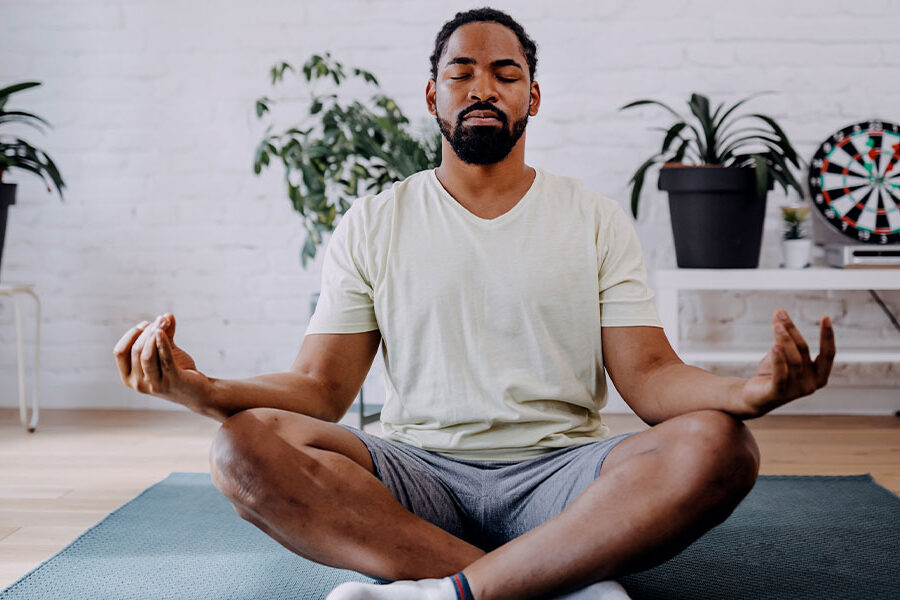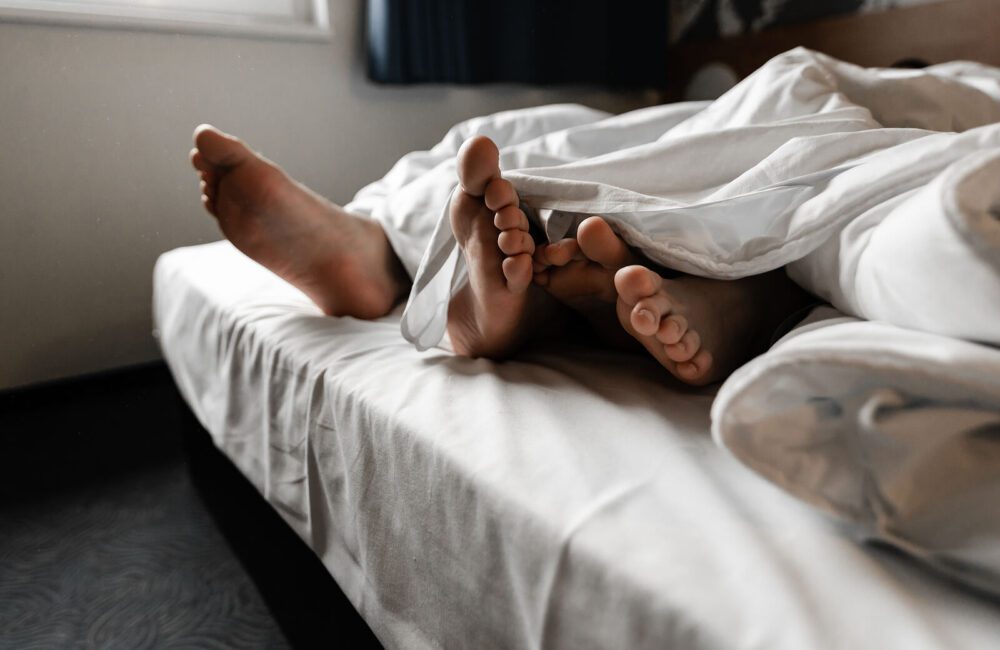Performance anxiety is a common issue that affects many men, leading to stress, self-doubt, and difficulty enjoying intimate moments. The pressure to “perform” can create a cycle of worry that negatively impacts confidence and relationships.
Recommended: Diet Tips for Naturally Improving Male Performance
The good news is that performance anxiety is manageable. By understanding its causes, making lifestyle changes, and using relaxation techniques, men can overcome anxiety and build a healthier, more fulfilling intimate life.
In this blog, we’ll explore practical ways to manage performance anxiety, strengthen emotional connections, and boost confidence for a better intimate experience.
Understanding Performance Anxiety in Men

Performance anxiety is a common issue that affects many men, leading to stress and self-doubt during intimate moments. It often stems from psychological pressure, stress, body image concerns, relationship issues, or medical conditions like erectile dysfunction. These factors create a cycle where fear of failure leads to performance difficulties, which in turn increases anxiety.
Recommended: Best Foods to Increase Sperm Count and Motility
This anxiety can cause physical challenges such as erectile dysfunction or premature ejaculation, as well as emotional distance in relationships. Over time, it may reduce confidence and interest in intimacy. However, performance anxiety is both normal and manageable. By understanding its causes and adopting stress-relief techniques, men can regain confidence and improve their intimate experiences.
Physical Factors That Contribute to Performance Anxiety
Performance anxiety isn’t just a mental struggle. It can also be influenced by various physical factors. These include medical conditions, lifestyle habits, and hormonal imbalances that affect sexual function and lead to increased stress and anxiety.
1. Stress and Fatigue
High levels of stress and lack of rest can reduce energy, making it difficult to focus and enjoy intimacy. Chronic stress increases cortisol levels, which can interfere with testosterone production and sexual performance.
2. Poor Blood Circulation
Healthy blood flow is essential for maintaining erections. Conditions like high blood pressure, heart disease, and diabetes can restrict circulation, making it harder to achieve or maintain an erection, which can lead to performance anxiety.
Recommended: Do Raw Eggs Increase Testosterone?
3. Hormonal Imbalances
Testosterone plays a key role in libido and sexual performance. Low testosterone levels, often caused by aging, stress, or medical conditions, can result in reduced desire and confidence, contributing to anxiety.
4. Excessive Alcohol and Smoking
Alcohol depresses the nervous system, which can slow down arousal and make it difficult to maintain an erection. Smoking damages blood vessels, reducing blood flow to the genital area, increasing the risk of erectile dysfunction, and worsening performance anxiety.
5. Poor Diet and Lack of Exercise
Unhealthy eating habits and a sedentary lifestyle can lead to obesity, high cholesterol, and poor cardiovascular health, all of which negatively impact sexual performance. Regular exercise improves blood circulation, boosts testosterone, and reduces stress, helping to manage anxiety.
Recommended: How to Increase Sperm Volume Overnight
6. Side Effects of Medication
Certain medications, including antidepressants, blood pressure drugs, and some painkillers, can interfere with libido and sexual function. When men experience these side effects, it can create fear and stress around intimacy.
7. Chronic Illnesses and Medical Conditions
Diseases such as diabetes, multiple sclerosis, and neurological disorders can affect nerve function and sexual response. When physical performance is impacted by a health condition, it can lead to self-doubt and heightened anxiety.
By identifying and addressing these physical factors, men can take proactive steps to reduce performance anxiety. Maintaining a healthy lifestyle, managing medical conditions, and seeking professional guidance when necessary can improve both confidence and sexual well-being.
How to Manage Performance Anxiety for Improved Male Intimacy
Performance anxiety can negatively impact intimacy, leading to stress, self-doubt, and strained relationships. However, it is manageable with the right approach. Here are effective strategies to overcome performance anxiety and improve confidence in intimate moments:
1. Practice Stress Management Techniques

Stress is a major trigger for performance anxiety. Engaging in relaxation techniques such as deep breathing exercises, meditation, or yoga can help calm the mind and body. Practicing mindfulness can also reduce overthinking and allow men to focus on the present moment rather than worrying about performance.
Recommended: How to Increase Penile Girth Naturally
2. Improve Communication with Your Partner
Open communication can relieve pressure and strengthen emotional intimacy. Expressing concerns and fears to a supportive partner can help build trust and reduce anxiety. A positive and understanding environment fosters confidence and reduces the fear of failure.
3. Maintain a Healthy Lifestyle
Good physical health contributes to better sexual performance. Regular exercise improves blood circulation, reduces stress, and boosts testosterone levels. A balanced diet rich in essential nutrients supports overall well-being, while avoiding excessive alcohol and smoking can prevent issues like erectile dysfunction.
4. Shift the Focus from Performance to Connection
Instead of placing pressure on achieving a specific outcome, men should focus on emotional and physical connection with their partners. Engaging in non-penetrative intimacy, such as kissing, touching, and foreplay, can help take the pressure off and build confidence.
5. Address Underlying Medical Conditions
Certain health conditions, such as high blood pressure, diabetes, or hormonal imbalances, can contribute to performance anxiety. Consulting a healthcare professional to manage these conditions can improve overall sexual function and reduce anxiety.
6. Seek Professional Help When Needed
If performance anxiety persists, speaking to a therapist or counselor can be beneficial. Sex therapy and cognitive-behavioral therapy (CBT) can help reframe negative thoughts and build confidence. In some cases, a doctor may recommend medical treatments or medications if necessary.
7. Develop Positive Self-Talk and Confidence
Negative thoughts and self-doubt can worsen performance anxiety. Practicing self-affirmations, focusing on strengths, and reminding oneself that intimacy is about connection rather than perfection can help build self-confidence.
Recommended: Can You Leave a Penile Implant Partially Inflated?
Managing performance anxiety takes time and patience, but with the right strategies, men can overcome their fears and enjoy a more fulfilling and confident intimate life.
The Power of Foreplay and Emotional Connection
Foreplay and emotional connection are key to a fulfilling intimate experience. True intimacy starts long before intercourse, as engaging in activities like kissing, touching, and verbal affirmations helps ease tension and boost confidence. When the focus shifts from performance to connection, pressure decreases, making intimacy more enjoyable.
Recommended: Does Getting a Vasectomy Affect your Libido?
Emotional closeness also strengthens trust and communication, creating a safe space where both partners feel valued. Open conversations about desires and boundaries enhance understanding, leading to deeper intimacy. By prioritizing foreplay and emotional bonding, men can reduce anxiety and build confidence, resulting in more satisfying and natural experiences.
Lifestyle Changes to Improve Sexual Confidence
Building sexual confidence starts with adopting a healthy lifestyle. Making positive changes in daily habits can improve physical health, reduce stress, and enhance overall well-being, leading to greater confidence in intimate moments. Here are some key lifestyle changes that can help:
1. Exercise Regularly
Physical activity improves blood circulation, reduces stress, and boosts testosterone levels—all of which contribute to better sexual performance. Strength training, cardio workouts, and activities like yoga can increase stamina and confidence.
2. Maintain a Balanced Diet
Eating nutrient-rich foods supports overall health and sexual function. Foods high in antioxidants, healthy fats, and essential vitamins—such as leafy greens, nuts, fish, and fruits—help improve blood flow and hormone balance. Avoiding processed foods, excessive sugar, and unhealthy fats can also prevent issues like erectile dysfunction.

3. Manage Stress Effectively
Chronic stress increases cortisol levels, which can negatively impact libido and performance. Practicing relaxation techniques like deep breathing, meditation, and mindfulness can help reduce stress and improve focus during intimacy.
4. Get Enough Sleep
Poor sleep affects testosterone levels, energy levels, and mood, all of which influence sexual confidence. Aim for at least 7–8 hours of quality sleep each night to support overall well-being and sexual performance.
Recommended: Does Semaglutide Decrease Libido?
5. Limit Alcohol and Avoid Smoking
Excessive alcohol consumption can lower testosterone and impair sexual function. Smoking restricts blood flow, increasing the risk of erectile dysfunction. Reducing or eliminating these habits can enhance performance and confidence.
6. Stay Hydrated
Dehydration can lead to fatigue and reduced blood circulation, which may affect arousal and performance. Drinking enough water daily helps maintain overall energy and stamina.
7. Focus on Mental Well-being
Self-doubt and negative thinking can contribute to performance anxiety. Practicing self-affirmations, developing a positive body image, and engaging in activities that boost self-esteem can help improve sexual confidence.
8. Strengthen Emotional Connections
Sexual confidence is not just about physical performance but also emotional intimacy. Open communication with a partner, expressing desires, and fostering emotional closeness can lead to a more relaxed and satisfying experience.
By making these lifestyle changes, men can enhance their overall health, reduce anxiety, and build lasting sexual confidence.
Conclusion
Performance anxiety can significantly impact male intimacy, but it is manageable with the right approach. Prioritizing emotional connection, engaging in effective foreplay, maintaining a healthy lifestyle, and fostering open communication can all help reduce anxiety and build confidence. Rather than focusing solely on performance, shifting attention to mutual pleasure and connection creates a more fulfilling and stress-free intimate experience. By embracing these strategies, men can enhance their confidence, strengthen their relationships, and enjoy a healthier, more satisfying intimate life.
